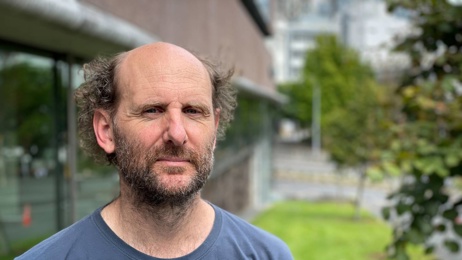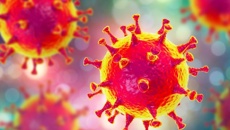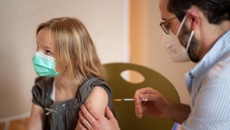Cabinet has agreed to move Waikato to alert level 2 from midnight tomorrow - and the rollout of booster vaccination shots will start from November 29.
Prime Minister Jacinda Ardern made the announcements this afternoon, after Cabinet met to discuss the country's Covid response.
She also said there is a strong view from the Ministry of Health to move to the new Covid protection framework "earlier" than previously outlined, and the Government is seeking expert views on this.
An announcement on Auckland's border will be made on Wednesday.
Ardern said contact tracing will soon be the way to deal with cases, instead of lockdowns.
Ardern said some people have put to the Government the idea of "reverse boundaries", such as putting boundaries in other regions outside Auckland, but she said this would be much more difficult.
Booster shot rollout
Anyone aged 18 and over who got vaccinated more than six months ago will be eligible for a booster shot from November 29.
Ardern said it was a "belts and braces approach" and that boosters topped up immunity back to above the 90 per cent mark.
The booster shots would be free and available for anybody in New Zealand, whether or not they were first vaccinated here or overseas.
Booster shots would be available at vaccination clinics, pharmacies and GPs, and could also be booked through the online Book My Vaccine website.
The first vaccinations in New Zealand were given nine months ago, in February, to border and MIQ workers, health workers and the elderly and immuno-suppressed.
"You don't need to rush to get this done," Ardern said.
Pfizer protection ranges from 85 to 90 percent, she said.
She said the country had enough vaccination supply to cover children being vaccinated and people receiving booster shots.
There were now 144,000 people who had been vaccinated for six months or more and 455,847 would hit that mark by the end of the year.
Many healthcare and border workers would be among that group because most had their first vaccinations more than six months ago.
Efforts would also be made to ensure older people, who were also vaccinated early under the vaccine rollout, had good access to the boosters, but they would not be rationed.
Vaccinologist Helen Petousis-Harris welcomed the rollout of booster vaccination shots, saying it was "completing" the course.
"What the boosters do is enhance on that second dose so you end up with a better immunity than you did at your peak after that second dose."
She said the elderly and people with compromised immune systems will benefit from a booster shot.
As boosters will be given to people six months after their second dose, Petousis-Harris said this will help those on the frontline as they were in the first group to get vaccinated earlier this year.
While questions have been raised around if Māori and Pasifika should be prioritised for booster shots, Petousis-Harris said many in these communities have only recently been vaccinated.
"A lot of them won't be eligible to get a booster [until later] because we didn't really go out to the wider population until June."
Waikato alert level change
Ardern said today's decision about the Waikato is a "temporary one".
She said the Government is "very keen" to move into the new Covid-19 framework.
"In some ways, the Covid-19 protection framework provides more safety ... than alert level 2," Ardern said.
She said social distancing and masks remain paramount in the area.
Waikato has the second highest rate of testing in the country and the area is about 3000 doses shy of reaching 90 per cent fully vaccinated.
Ardern said the decision to move Waikato to alert level 2 restrictions was based on advice from the public health team on the ground, saying it was safe to do so because cases are linked and not unexpected.
Director general of Health Ashley Bloomfield said the Ministry of Health team was clear last week that it was appropriate for Waikato to move down a level, and they felt it was "more simple and more consistent with the rest of the country" to move to alert level 2.
Bloomfield said cases can be isolated and identified and are not "widespread".
On Auckland, schools and vaccine mandates
Bloomfield said vaccination plays two important roles - reducing infection and the likelihood to get "very unwell and die" and testing can't do those things.
When asked about her trip to Auckland last week, Ardern said she will look to have formal talks with the hospitality sector on future visits.
Ardern said work is under way to make sure people who don't have New Zealand forms of ID can sign up to the vaccine passport online. Officials will need to ensure there are those provisions, she said.
She said people can already go on the website to set up their health record, and a number of people have already started doing that.
Bloomfield said more than 30 people were at a gathering in the Wairarapa that an infected person attended, but many of them have been tested and vaccinated.
Ardern said she "strongly" agrees with the view that the new Covid protection framework is "better suited" for a vaccinated environment and the country can move into it "perhaps sooner than expected".
She said it was clear moving into the new Covid-19 framework sooner would be the best protection as cases begin to pop up outside of Auckland.
Ardern said she would expect Kiwirail to deal with any issues with employment matters at an operational level, including by the board.
Bloomfield said the new framework does require vaccination certificates for it to work, but opportunities to download them are imminent.
Bloomfield said vaccine mandates capture people in Oranga Tamariki that provide regular care for others, such as social workers. Ardern said her view is that this would not be widespread.
No schools have been unable to open for learning as a result of the vaccine mandates, Ardern said, although 11 schools are indicating they have a "high risk" of losing staff.
Overall there have been four exemption applications, which are being assessed by the Minister, she said.
Bloomfield said there have been 68 applications for exemptions under the "significant services disruption" category.
Ardern said she said she is concerned there are reports of raw sewerage at Whangarei Hospital. Bloomfield said it is not compromising patient care but there is significant need for a new building programme at the hospital.
Bloomfield said data sharing is now happening with Whanau Ora and had already happened before any court action.
He said they are in the process of establishing "shared governance" of data between the Ministry and Māori Health Authority and he is confident that will help to "cut through on the use of data".
Bloomfield said of new cases in the past 24 hours, 58 per cent were Māori, 29 per cent Pacific peoples, 14 per cent European/other and about 2 per cent Asian.
Of the current cases in hospital, 36 people identify as Māori, 26 as Pacific peoples, 24 are non-Māori & non-Pacific and one ethnicity is not defined, Bloomfield said.
Earlier today
A large portion of Waikato from the Auckland boundary to Mokau in the south, and from the coast to Karapiro, is in level three.
Areas in lockdown include extensive rural districts and the city of Hamilton.
The outbreak was creeping through the lower North Island over the weekend and is now knocking on Wellington's door.
Third doses or booster shots of the vaccine have already been recommended for severely immunocompromised people aged 12 and older.
Earlier, epidemiologist Prof Michael Baker said any changes to alert levels today would have to rely on feedback from frontline health workers, who could assess the likelihood of undetected transmission happening.
"You have to be pretty confident that you have a good handle on transmission," the University of Otago public health specialist said.
"People don't always come forward if they have symptoms."
He said health workers would have the best insights into the nuances and details of local cases, but areas outside Auckland should still be trying to eliminate the virus.
Baker said most available evidence indicated booster shots were best used about six months after a person's second dose.
"The biggest benefit is it reduces your ability to transmit infection," he said.
"It looks like at a certain point, everyone will need a booster.
"To help dampen down the outbreak, it's really important their resistance to getting infected stays high."
Today the Ministry of Health reported 173 new Covid-19 cases in the community.
The vast majority of new cases were in Auckland, but seven were in Waikato.
Of the Waikato cases, three were from Ōtorohanga, two from Hamilton, one from Kawhia, and one from Huntly. Five of the new cases were linked.
Today, two new cases were reported n Northland, one in Lakes district - the area in and around Rotorua - and there was also a new case in Wairarapa.
Director-general of health Dr Ashley Bloomfield is expected to join Ardern for the 4pm Beehive press conference.
The Prime Minister earlier today clarified that a so-called Freedom Day for Auckland will not happen on Monday November 29.
On that day, Cabinet will decide the date for a major easing of restrictions, but Ardern expected it to be very soon after the 29th.
Take your Radio, Podcasts and Music with you









